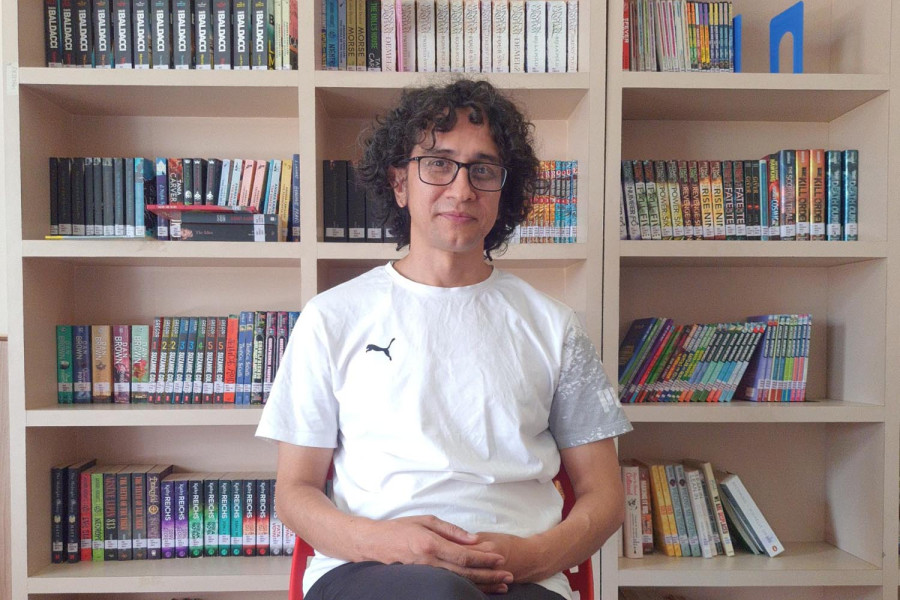Books
Drama influences my fiction writing
Theatre director and writer Tanka Chaulagain talks about his new book, ‘Rudane’, and how he lets imagination guide storytelling.
Rishika Dhakal
Tanka Chaulagain is a theatre artist, writer, and director. He has directed various plays, such as ‘Romeo and Juliet’, ‘Charlie and the Chocolate Factory’, and ‘Matilda’. Chaulagain is also the founder of ‘Lalabala’, an acting platform for children. He has also authored several books, such as ‘Kathmandu Geet’, ‘Taalatuli’, and ‘Ubadkhaabad’.
In this conversation with the Post’s Rishika Dhakal, Chaulagain discusses his newly published book ‘Rudane’.
What is your recent book about?
My latest book is based on the life of Rup Chandra Bista, a well-known political figure. It's a mix of biography and fiction. Since the book is autobiographical fiction, some readers have asked why I chose to fictionalise Bista’s life instead of writing a straightforward biography. As someone with a background in theatre and drama, I was drawn to the dramatic elements of his journey. While biography is bound by facts, which anyone can research and present, fiction allows me to explore, be creative, and let my imagination shape the narrative. This approach makes the story more engaging, so I opted for a fictionalised account of Rup Chandra Bista’s life.
While writing fiction, there’s a concern that the emotional elements might overshadow the historical facts, potentially erasing them. So, how have you balanced these aspects to avoid distorting history?
I was aware of the challenge this posed as a writer. I never met Rup Chandra Bista, so I can’t write about him from a personal perspective. Sometimes, it’s easy to exaggerate a person's character when trying to make the narrative more dramatic, making them seem different from who they truly were. To ensure I was fair in my portrayal, after finishing the draft, I gave it to Rup Chandra Bista’s nephew, Bhuwan Prakash Bista, for his review. He raised similar questions and suggested a few corrections.
Taking his feedback seriously, I revised the manuscript several times, carefully considering what he was trying to convey. After four or five rounds of edits, I feel I was able to present a more accurate balance of Bista's personality.
However, my portrayal is still based on my understanding of him as a charismatic leader. I gathered information by listening to people who knew him and reading articles about his life, but my depiction may not fully capture his philosophy. That’s why I called it fiction.
Why did you write about Rup Chandra Bista?
In 2020, I did a play about Yogmaya, which was well-received. Yogmaya advocated a ‘dharma rajya’—a just and righteous society. While searching for another figure with a similar revolutionary spirit, I came across Rup Chandra Bista, whose story captivated me.
A film about Bista was planned then, but the project was halted for 3-4 years and eventually cancelled. One of my brothers suggested turning the story into a drama. However, I was more fascinated with the narrative itself, and instead of writing it for the stage, I chose to turn it into fiction. That’s how the idea for the book emerged.
Another reason I decided to write about Bista is that, in today’s political landscape, I don't see any leader with a philosophy like his. Bista was a leader who connected with people from all social classes. He had a separate group for children, encouraging them to “Know”—his guiding motto. He believed that awareness was key to individual and societal change. He also formed a group for women and supported their causes.
Although Bista came from a wealthy family, he chose to live among the poor. He worked alongside them, striving to enlighten and uplift the marginalised.
Bista’s deep connection with people and unique vision drew me to his story, leading me to base my book on his life.
How important is your new book in today’s political and social climate?
Looking back at history, Rup Chandra Bista was a political figure who thrived within the system of his time, winning elections multiple times during the Panchayat era. Yet, he wasn't afraid to openly criticise the Panchayat governments for their wrongdoings.
Despite his privileged background, Bista lived a simple life. He strongly believed in reusing things and always wore second-hand clothes. In today’s world, with issues like climate change and overuse of resources, Bista’s lifestyle should resonate with our society. Inspired by him, I’ve started sleeping on the floor to feel more connected to the Earth.
Bista also spent two decades living with farmers in Sim Bhanjyang, where he grazed goats and cultivated potatoes and cauliflower to improve their livelihoods. His focus on uplifting the underprivileged reflected his belief that society can only progress when the most disadvantaged rise.
Looking at Nepal’s current political situation—where there is no consensus among parties and governance feels disorganised—alongside society’s increasingly materialistic values, I believe this book is more relevant than ever.
How has your background in drama influenced your approach to writing fiction?
As a drama student, I naturally include a lot of dialogue in my fiction writing. Writers like Buddhisagar and Subin Bhattarai often focus on playing with words and descriptions, but in my process, I focus on creating scenes, establishing characters, and weaving in dialogues. For instance, my book ‘Rudane’ has plenty of dramatic dialogue. Without them, the book could have risked becoming a straightforward biography. However, the dialogue helped breathe life into the characters. Writing them and building scenes allowed me to bring the story to life.
Writing drama in Nepal is particularly challenging. The play's audience is small, and there is no guarantee that it will reach its intended audience or be published and read. That's one of the reasons I shifted toward fiction writing. However, I still translate plays I enjoy, which helps me balance my love for both forms. Even in my fiction, especially in the dialogues, the influence of drama is quite evident.
While fiction usually requires fewer dialogues than drama, writing both involves building vivid scenes. For example, when writing a scene with four characters in a café, I instinctively imagine the entire setting, down to the smallest details. My background in drama has been invaluable in this regard, as it has helped me visualise scenes more easily and bring them to life in my fiction.
What message do you want to convey to readers through your book?
Rup Chandra Bista's life offers many valuable lessons. He believed in living a minimalist lifestyle and prioritised using Nepali products. Bista often wore clothes, bags, and other items made from burlap sacks. Despite being offered prestigious jobs, including one by Juddha Shumsher, he always put the well-being of others before his own.
In contrast, today's generation often focuses more on personal gains than thinking of others. Through my book, I hope readers will learn from Bista’s selfless lifestyle and reflect on how they can also think about the needs of others. Bista was a man of strong principles and died on his terms. His statement, “Those I tried to awaken never did. Those who were awakened only ended up supporting the opposition,” reflects his deep frustration with the political system of his time.
Beyond the political and social lessons, Bista's life, as shared through various articles and stories, offers timeless insights into leadership, selflessness, and the pursuit of justice for all.
Tanka Chaulagain’s book recommendations
Sotala
Author: Dor Bahadur Bista
Publisher: Sajha Prakashan
Year: 1976
Bista's work captures a bygone era when many Nepalis journeyed to Tibet for the salt trade, offering readers a glimpse into Nepali society at that time.
Lamppost Bata Khaseko Joon
Author: Manu Manjil
Publisher: FinePrint
Year: 2011
This poetry collection features forty-six free verse poems and the book is known for its portrayal of contemporary Nepali culture.
Mantha Darayeko Jug
Author: Mohan Mainali
Publisher: Heritage Publishers and Distributor
Year: 2015
This book chronicles the lives of those who were killed during the war, highlighting their valiant efforts to protect themselves and their families.
Yashodhara
Author: Haribol Kafle
Publisher: Lipi Books
Year: 2023
Told from Yashodhara's perspective, this novel provides a fresh view of Siddhartha's journey to becoming the Buddha.
Ular
Author: Nayanraj Pandey
Publisher: Tanneri Prakashan
Year: 1998
This book is a window into the harsh reality of politics and people who have suffered from political instability.




 17.12°C Kathmandu
17.12°C Kathmandu










